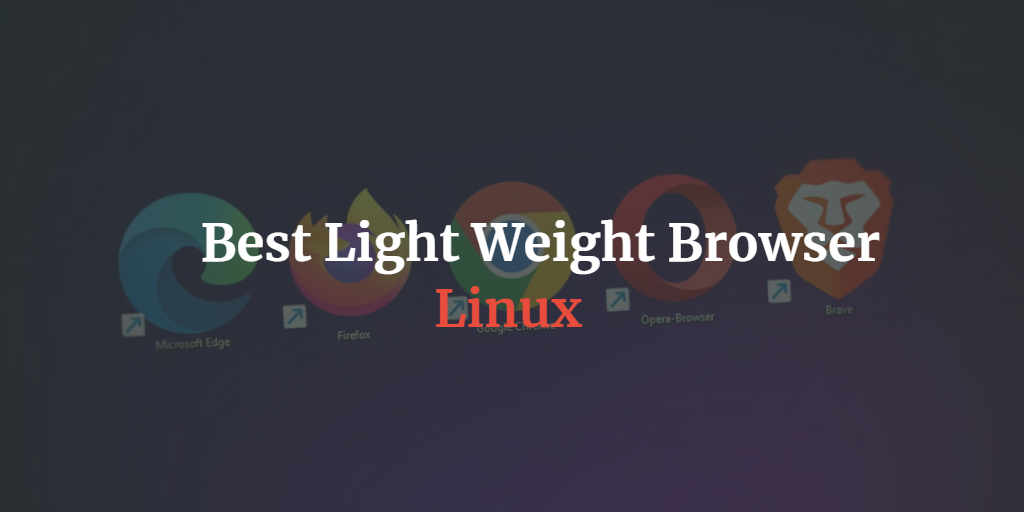Best Light Weight Browser for Linux

If you’re a Linux user with a system that’s light on resources or just looking for a browser that prioritizes speed and simplicity, finding the best light weight browser for linux can make all the difference. While heavyweight browsers like Chrome and Firefox offer robust features, they can be overkill for those with older hardware or for users who simply want a faster, more streamlined experience. If you have old hardware available, maybe consider turning it into your very own homelab.
In this post, we’ll explore the best lightweight browsers for Linux, focusing on their performance, features, and overall usability. Whether you’re running a minimal distro or just want to save on CPU and RAM usage, there’s a browser here for you.
1. Midori
Midori is an open-source browser that’s perfect for users seeking simplicity without sacrificing essential features. It’s built with the WebKit engine, ensuring good performance and compatibility with modern web standards, while maintaining a minimalistic design.
- Pros:
- Fast and responsive with low resource consumption.
- Clean and user-friendly interface.
- Privacy-conscious with built-in ad blocking and cookie management.
- Cons:
- Limited extensions compared to bigger browsers.
- Some users report occasional compatibility issues with heavily scripted websites.
Midori is a solid choice for those who prioritize speed and simplicity.
2. Falkon
Originally developed by KDE, Falkon is a lightweight browser using the QtWebEngine. It’s perfect for users already in the KDE ecosystem, but its efficiency makes it appealing to anyone on Linux looking for a fast browsing experience.
- Pros:
- Sleek integration with KDE Plasma desktop.
- Support for extensions (including built-in ad blockers).
- Great balance between speed and modern browser features.
- Cons:
- Less customization compared to browsers like Firefox or Chromium.
- Limited support for certain web applications.
Falkon stands out with its blend of lightweight performance and essential features, especially for KDE users.
3. Qutebrowser
If you’re a fan of keyboard-driven workflows, Qutebrowser might be your ideal lightweight browser. This minimalist browser is designed around Vim-like key bindings, making it extremely efficient for those who prefer to navigate without a mouse.
- Pros:
- Keyboard-centric browsing with Vim-like commands.
- Very minimal interface, allowing for maximum speed.
- Customizable and great for power users who love the command line.
- Cons:
- Steeper learning curve for users unfamiliar with keyboard shortcuts.
- Minimal extensions and plugins support.
Qutebrowser is perfect for power users who want a fast and efficient browser with full keyboard control.
4. NetSurf
NetSurf is one of the lightest browsers available for Linux, designed specifically to run on low-resource systems. It’s ideal for very old hardware or ultra-minimalist Linux distributions.
- Pros:
- Extremely lightweight, even for systems with very limited resources.
- Simple and clean interface.
- Custom-built rendering engine optimized for performance.
- Cons:
- Limited support for modern web standards like JavaScript-heavy websites.
- Basic functionality with minimal customization options.
NetSurf excels at basic web browsing, making it a go-to for low-powered systems where resource efficiency is critical.
5. Lynx
For the ultimate in minimalism, Lynx is a text-based browser that operates entirely in the terminal. While it’s certainly not for everyone, it’s unbeatable in terms of speed and resource efficiency, making it ideal for users who don’t need to view images or multimedia content.
- Pros:
- Extremely fast and uses virtually no system resources.
- Perfect for those who prefer to work in the terminal.
- Great for reading articles and text-based content.
- Cons:
- No support for images, multimedia, or JavaScript.
- Not suitable for modern websites with complex layouts.
Lynx is the ultimate choice for users looking to browse purely textual content with maximum efficiency.
6. GNOME Web (Epiphany)
GNOME Web, also known as Epiphany, is the default browser for the GNOME desktop environment. It offers a simple interface and is closely integrated with the GNOME ecosystem. While not as feature-heavy as Firefox or Chrome, it offers a clean and efficient browsing experience for users on the GNOME desktop.
- Pros:
- Lightweight and well-integrated with GNOME.
- Easy-to-use interface with smooth performance.
- Privacy-conscious features like intelligent tracking prevention.
- Cons:
- Limited extension support compared to Firefox or Chrome.
- Some sites may have compatibility issues due to lack of wide extension support.
Epiphany is an ideal choice for users of the GNOME desktop looking for a browser that fits seamlessly into their workflow.
7. Viper Browser
Viper Browser is an up-and-coming minimalist browser aimed at those who value performance and simplicity. Built on the QtWebEngine, Viper Browser offers a no-frills experience without compromising on speed or usability.
- Pros:
- Fast and light with a minimalist design.
- Focuses on privacy, with built-in ad-blocking and tracker prevention.
- Quick startup and smooth browsing experience.
- Cons:
- Still relatively new, with fewer features compared to more mature browsers.
- Extension support is limited.
Viper Browser is an excellent option for users who want to get in early on a rising lightweight browser focused on privacy and efficiency.
Conclusion
Linux offers a fantastic ecosystem of browsers that cater to users who prioritize lightweight performance and efficiency. Whether you need a browser for an aging machine, or just prefer speed over feature-bloat, there are plenty of options to choose from.
- For simplicity and user-friendliness, Midori and GNOME Web (Epiphany) are fantastic choices.
- If you’re a power user or keyboard enthusiast, Qutebrowser offers unmatched speed and control.
- For ultra-lightweight systems, NetSurf and Lynx are unbeatable in their minimalism.
Explore these browsers and find the one that fits your workflow best. No matter which you choose, you’ll enjoy faster browsing without the heavy load on your system.







